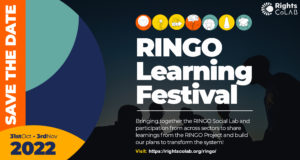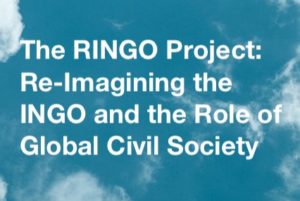From the very beginning, it was meant to be a journey. We knew our destination, we were not sure how to get there, but this is what the process was meant to show us. We were dissatisfied with where we were; in an inequitable international development space where the resources, respect and trust scales were tilted towards the global North, with INGOs being, to a considerable extent, a convenient vehicle for sustaining this power imbalance.
We knew that reaching the sustainable development goals would continue to be a mirage if we stayed where we were. So for many of us, after years of complaining and wishing for better, we decided it was time to act and embark on this journey. It was time to change things for the better, and we were going to make that move towards action. We coalesced around the idea of Reimagining the INGO (RINGO), a systems-change path that has taken us through a humbling process of learning, a challenging process of making meaning out of what we had learnt but even more importantly, a process of actually prototyping possible solutions. The latter is still on course – as I mentioned earlier – this is a journey.
So, who are ‘we’? ‘We’, are a dynamic group of 73 people; seven from Canada, UK, Ghana, India, Peru and Kenya, who make up the RINGO core team; a Social Lab of 55 people from Uganda, Canada, United States, UK, Russia, Peru, India, Nigeria, Ghana, Netherlands, Belgium, Italy, Thailand, Sierra Leone, Kenya, Botswana, Guatemala, France, Australia, Mexico, Turkey, Pakistan, Sweden, Nepal, Indonesia, South Africa, Brazil and Sri Lanka. Supported by two institutions, Rights CoLab and the West Africa Civil Society Institute (WACSI) and an Advisory Board with colleagues like Wolfgang Jamann (ICSC), Lysa John (CIVICUS), Lydia Alpizar (Mesoamerican Women Defenders Initiative), Deborah Willing (InterAction), Enrique Piraces (Carnegie Mello University), Jonathan Glennie (GPI), Degan Ali (Adeso), Everjoice Win (The Shine Campaign), Theo Sowa, Francisco Lara (University of the Philippines) and Irungu Houghton (Amnesty Kenya), we put our shoulders to the wheel. Embarking on this course demanded patience, skill, empathy and commitment and it needed seasoned facilitation – Reos Partners provided that. It took faith from funders like the Ford Foundation, Bosch Foundation and the Hilton Foundation to provide the funding, alongside others, to undertake this journey of discovery with us to find out how to right what is wrong. Along the way we have forged active and supportive partnerships with ICSC, Partos, Disrupt Development and the Global Fund for Community Foundations.
It has taken close to two years and has been engaging, sometimes exhausting, sometimes exhilarating, many times rewarding and better still, a journey of great promise. Our Social Lab has now grown to over 95 members, all contributing to the process in diverse and valuable ways. We are already seeing positive outcomes, and the hope of real transformation is happening in the sector.
Teams within the Social Lab are working on eight prototypes: a decolonising advisory community; a participatory grantmaking framework, a Pledge for Change accountability mechanism, an alternative solidarity model, a climate justice transition framework, a new approach to risk sharing and compliance, and promoting inclusive language and lexicon. We will be gleaning the lessons and sharing as widely as possible, as we learn. We trust that key parts of the international development ecosystem (with INGOs playing a critical role) will take up what is needed to respond to the taxing issues around tangible ways of shifting power, decolonization and localization. These may be the buzzwords of today but are still weighty matters that have real impact on the daily lives of people. This is not an academic exercise – it translates directly into whether or not development will be sustainable for the average man, woman and child, especially in the ‘global south’.
The RINGO Learning Festival will take place in the first week of November and will provide the opportunity to look back and see how far we have come and what else we can do to make even better progress along this journey. It promises to be enlightening, exciting and perhaps even sobering to some extent. It will close the first phase of the RINGO journey. We will be moving on to the next and invite more partners to move along with us. Will you join us? Find out more from 31 October to 3 November 2022 during the Learning Festival.
There is a Ghanaian proverb that says that ‘Knowledge is like a Baobab tree and no single person can embrace it’. It needs many of us to embrace RINGO not only theoretically but practically to bring about the transformation that is needed. You are invited!
Photo by Leon Pauleikhoff on Unsplash

